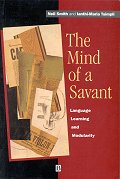Christopher is an intriguing subject for linguists and cognitive scientists. He is severely retarded in many areas, yet has some amazing linguistic skills. His first language, English, is excellent, except for "difficult" cases where there is "cognitive overload", such as for garden path sentences or recursive sentences that require heavy processing, or tasks needing a "theory of mind", or jokes. His skill in other languages is impressive. He learns them with remarkable speed, and can develop an excellent vocabulary and grasp of morphology (agreements in number and gender, for example), although his grammar is not so good, being influenced by his English grammar.
The authors have closely studied Christopher over several years, in an attempt to understand the "modules" that language and mind might be divided into. In particular, they have tried to clarify the scope and roles of vocabulary and syntax "modules". As part of this exercise, they closely studied the languages Christopher already knew, getting him to judge the grammatical correctness of sentences, to produce grammatical sentences, and to translate between languages.
They taught him a new language: Berber. This is a verb-subject-object (VSO) order language that also allows a SVO order. Christopher consistently produces Berber sentences in English-like SVO order, but allows VSO examples to be grammatical. This implies his grammar production is strongly English-influenced, but that his encyclopedic knowledge of language examples allows recognition of the VSO.
As a further test, they also taught him Epun: an invented "impossible" language. ("Impossible" in the sense that no known language exhibits the features, and that the features are deemed impossible by the theory of language being tested.) As a control they taught same material to four first-year linguistics students, to see if their "pattern matching intelligence" could make up for the inability of their "language module". Christopher was enthusiastic about learning it, his 20th language. Again, results imply his recognition is better than his production. The impossibilities included
- impossible structure -- for example, an emphasis marker is always attached to the third word of sentence, independent of grammatical construction. Neither Christopher nor the controls ever discovered this pattern, and the authors speculate that linguistic modules are inhibiting non-linguistic pattern matching
- impossible morphology -- Christopher could get this right, whereas the controls got it wrong
- impossible syntax -- for example, word order affecting negation and tense -- Christopher got this wrong, but the controls could get it right (possibly using some form of intelligent non-linguistic learning)
Despite the authors' comment in their preface that "It is intended that the book be accessible to as wide an audience as possible ... [including] the proverbial general reader", this is not light read, and frankly I doubt whether many general readers will have the depth of knowledge of linguistic terms freely used to appreciate all the evidence and arguments. I was forced to skim large sections. Despite this, I came away with a vivid impression of Christopher, his linguistic skills, and some of the conclusions drawn from the authors' careful experiments. This work clearly demonstrates how complex a phenomenon intelligence is, and how separate some parts of language skills are from what we think of as "intelligence", and how dependent other parts are on it.
Worth the skimming.
The authors' studies of Christopher continue. A note on the Web states: Together with Professor Bencie Woll, of City University, London, we are immersed in a three year project, funded by the Leverhulme Trust, teaching [Christopher] British Sign Language (BSL).
